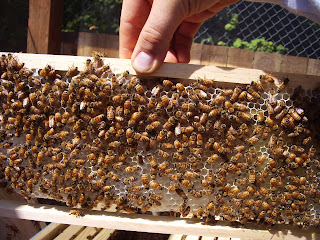
Honey bees, along with birds and bats, pollinate over one third of the food that humans eat. Without honey bees it wouldn't be just honey that we would miss, but many fruits, nuts, and vegetables.
To prepare for the bee's arrival, we built a small enclosure for the hives so people can view the hives up close without having bees fly in their faces. The enclosure also prevents people from accidentally bumping the hives.
The bees came from an apiary in California, by way of the Beez Neez in Snohomish. They arrived in a wood and mesh package that contained:
- Three pounds of worker bees
- One queen bee
- Food for the bees during their travels
 |
| The bee travel boxes are lying in between the hives |
- Drones are the male bees. Every day they fly around and look for a queen bee to mate with. Drones are only a small percentage of the bees in the hive.
- Worker bees are underdeveloped female bees. They are the majority of the bees in the hive, and they do many different tasks. The worker bees gather nectar and pollen from flowers, raise the young bee larva, and defend the hive from intruders.
- Queen bees are fully developed female bees. A bee colony usually has only one queen bee, and she lays all of the eggs. A queen bee can lay 1,500 eggs in a single day!
 |
| Can you spot the queen? |
~Farmer Scott, Seattle Community Farm

No comments:
Post a Comment